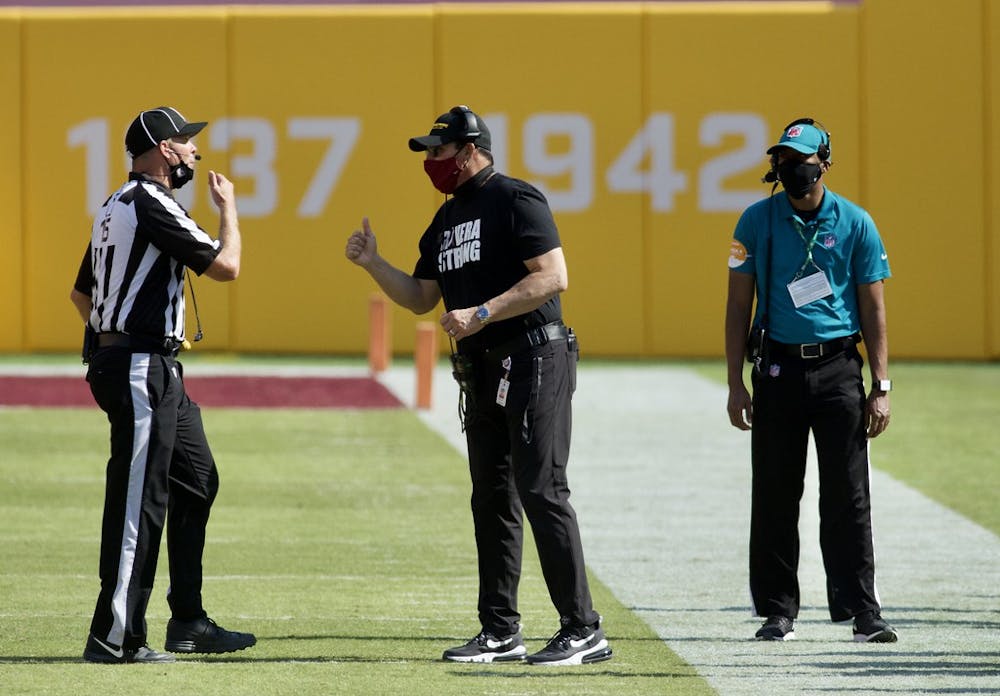Washington Football Team (WFT) head coach Ron Rivera went viral over the summer when he expressed his frustration with the low coronavirus vaccination rate among members of his team during a training camp press conference on July 27.
At the time of the conference, the WFT had a vaccination rate of 60 percent, which was significantly below the 85 percent vaccination rate across the rest of the National Football League (NFL) according to a Washington Post report. Rivera’s personal experience and empathetic approach to vaccine education serves as an important example of how to approach tensions regarding COVID-19 safety.
“We are not where we want to be … I am beyond frustrated,” Rivera said in the press conference. “These young men have to make the decision for themselves. Hopefully, they can understand how impactful not getting the vaccine is and you'd like to believe with all the news that's been out there in terms of the fact that people are being hospitalized, that are dying from COVID-19 right now, are those that aren't vaccinated.”
While Rivera certainly is not the only one in the NFL to voice his frustration with unvaccinated players or other protocol breaches regarding COVID-19 rules, he does have a uniquely consequential reason for wanting those around him to be vaccinated.
In August of 2020, Rivera was diagnosed with a form of skin cancer called squamous cell carcinoma. Despite the shocking news, Rivera decided to continue performing his duties as head coach while undergoing chemotherapy. During pregame warmups throughout the regular season, the WFT wore “Rivera Strong” to show their support for the coach. After two months of treatment, Rivera was again surrounded by supportive health care workers and friends wearing Rivera Strong T-Shirts as he rang the cancer remission bell.
Despite being in remission, Rivera remains immunodeficient which means he is at a higher risk of becoming seriously ill if he were to contract COVID-19. In the same press conference, Rivera recognized this personal health concern.
“When I'm in a group and the group's not vaccinated or there's a mixture, I put the mask on, and I do that for health reasons because nobody really knows. And I just wish and I hope that our guys can understand that,” Rivera said.
There is an obvious disconnect between the support everyone showed for Rivera during his cancer battle and the willingness of these same players to get the vaccine, even though research from the Center for Disease Control shows that doing so will keep Rivera and other immunodeficient people safe and healthy.
The discourse regarding vaccinations in the NFL has become incredibly polarizing, especially due to the strict new COVID-19 protocols imposed by the league office. For example, if unvaccinated players cause an outbreak on their team they may be required to forfeit a game. This has caused some players such as Ryan Tannehill of the Tennessee Titans to reluctantly get vaccinated despite not wanting to, while other players such as Cole Beasley of the Buffalo Bills have refused, claiming it is a violation of each individual's personal choice.
Kirk Cousins, who formerly played for the WFT and is the current quarterback for the Minnesota Vikings, also took a hard stance against getting the vaccine. When Cousins missed after missing four training camp practices for violating COVID-19 protocols he claimed he would rather surround himself with “plexiglass” and not make contact with anyone instead of getting the vaccine.
Rivera’s position as a cancer survivor and respected coach in the NFL gives him an opportunity to take a more empathetic approach toward convincing those who are reluctant to get the vaccine. To open training camp, Rivera had individual conferences with each of his players to talk about the importance of getting the vaccine. He also brought in Harvard immunologist Kizzmekia Corbett to talk to players and answer any questions they had about the vaccine.
In only a few weeks following Rivera’s emotional press conference, the Washington Football Team’s vaccination rate climbed from only around 60 percent to 84.5 percent, just around the league average, according to the Washington Post. This not only demonstrates the success of Rivera’s empathetic approach but creates an effective framework for how the larger world can approach talking to others about the importance of getting vaccines.
Anyone who is a fan of the NFL or any sport over the past year remembers the frustration when COVID-19 caused the cancellation or suspension of games and players. Now that the majority of people in America have access to the vaccine, it is imperative to create similarly empathetic and educational environments to prevent similar shutdowns in sports and in the larger world from occurring.





